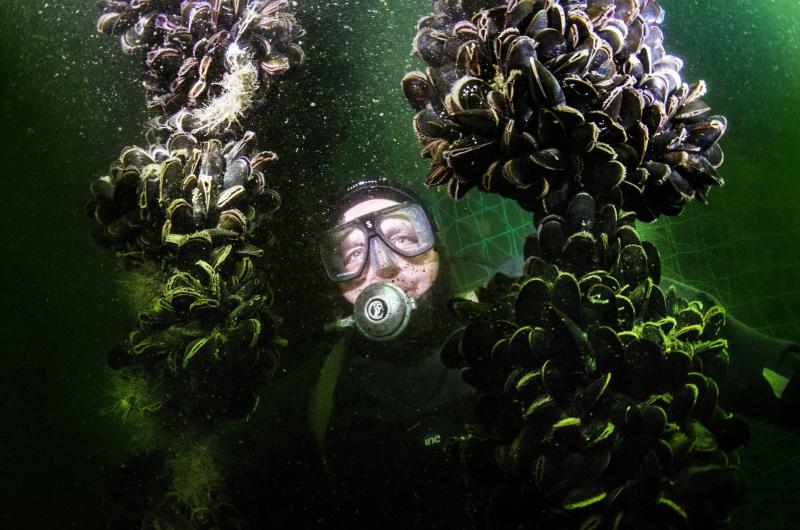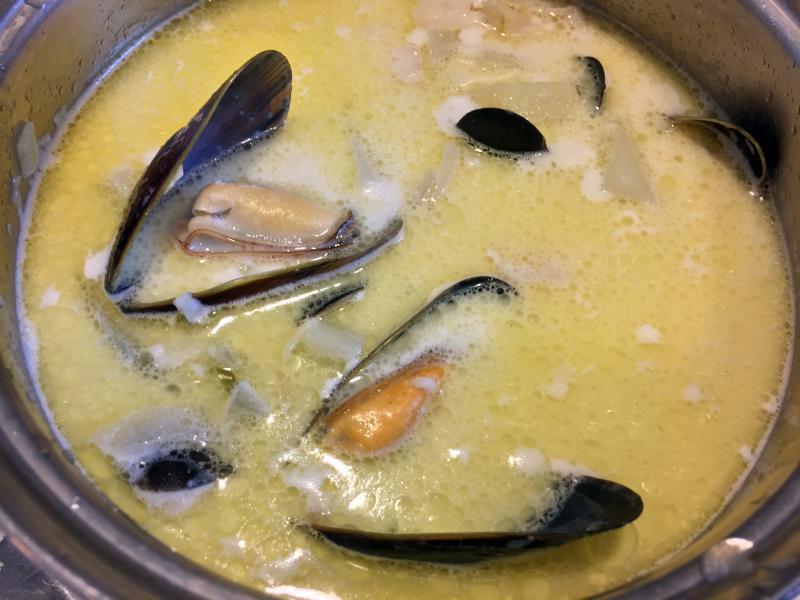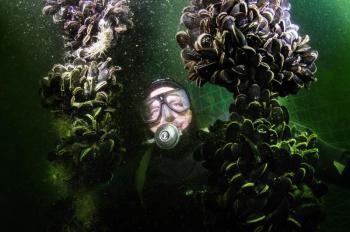Maine mussels: Not on the rocks
 Carter Newell of Pemaquid Mussel Farm shows off some of his cultured mussels. Courtesy of Carter Newell
Carter Newell of Pemaquid Mussel Farm shows off some of his cultured mussels. Courtesy of Carter Newell
 Surface mussel raft. Courtesy of Carter Newell
Surface mussel raft. Courtesy of Carter Newell
 Buoys mark an underwater mussel raft. Courtesy of Carter Newell
Buoys mark an underwater mussel raft. Courtesy of Carter Newell
 Mussels fresh off the ropes. Courtesy of Carter Newell
Mussels fresh off the ropes. Courtesy of Carter Newell
 Mussels growing on rope. Courtesy of Carter Newell
Mussels growing on rope. Courtesy of Carter Newell
 Mussel chowder made with leftover mussels and broth from Damariscotta River Grill. SUZI THAYER/Boothbay Register
Mussel chowder made with leftover mussels and broth from Damariscotta River Grill. SUZI THAYER/Boothbay Register
 Carter Newell of Pemaquid Mussel Farm shows off some of his cultured mussels. Courtesy of Carter Newell
Carter Newell of Pemaquid Mussel Farm shows off some of his cultured mussels. Courtesy of Carter Newell
 Surface mussel raft. Courtesy of Carter Newell
Surface mussel raft. Courtesy of Carter Newell
 Buoys mark an underwater mussel raft. Courtesy of Carter Newell
Buoys mark an underwater mussel raft. Courtesy of Carter Newell
 Mussels fresh off the ropes. Courtesy of Carter Newell
Mussels fresh off the ropes. Courtesy of Carter Newell
 Mussels growing on rope. Courtesy of Carter Newell
Mussels growing on rope. Courtesy of Carter Newell
 Mussel chowder made with leftover mussels and broth from Damariscotta River Grill. SUZI THAYER/Boothbay Register
Mussel chowder made with leftover mussels and broth from Damariscotta River Grill. SUZI THAYER/Boothbay Register
Remember when you could go down to the seashore at low tide and pick mussels off the rocks for a free meal?
A few years ago they started to disappear, at least from the rocks.
Mussels are one of Maine's most coveted seafoods. But the bivalve molluscs that used to be readily available and ripe for the picking aren't quite so easy to come by these days. Marine biologist Jon Lewis said mussel settlement on mudflats and rocks has become a problem. “The decline in wild mussels may be related to warming waters, predators such as green crabs, ice scouring or ocean acidification.”
Luckily for mussel lovers, the larvae of mussels are still abundant — and mussel farmers are seeing to it that there are still plenty of mussels for consumption.
Mussels in the larval stage can float around for up to six months before attaching to a hard surface using “byssal threads.” Mussel farmers place lengths of rope in strategic locations, where there are a high number of wild spawn, and the mussel seeds attach themselves to the rope.
The 45-foot ropes are then suspended from rafts, and the mussels continue to grow, siphoning water and feeding on phytoplankton, tiny marine plants that happen by. According to Lewis, a marketable farmed mussel can be produced in one to two years.
Carter Newell started his business, Pemaquid Mussel Farm, in 2007. Prior to that, he worked for Great Eastern Mussel Farms in Tenants Harbor.
In the 1990s, Newell and around 50 other entrepreneurs got together with representatives from the Island Institute in Rockland and formed the Mussel Working Group. They started talking about mussel farming, beginning with how they’d collect the seed.
In the late ’90s, the group got enough financing to bring a 40-foot x 40-foot, 30-ton capacity raft from Scotland. Mussel farming using rafts started in Spain, where hundreds of tons of mussels are cultivated annually. According to the Pemaquid Mussel Farm website, rafts have the advantage of growing a large amount of mussels in a small area, and the mussels can be protected from predators like sea ducks by using nets. The rafts also create favorable hydrodynamics for mussel feeding.
The raft was such a success, Newell and fellow enthusiasts starting building their own. They built 35 40-foot x 40-foot rafts, each with 360 45-foot long ropes attached to them. The group set up 10 mussel farms between Portland and Jonesport and built a 60-foot barge named Mumbles. By the time the mussels come off the barge, they're clean and ready to be delivered to restaurants.
The 10 farms have now been pared down to three operated by Pemaquid — one each in Lamoine, Stonington and South Bristol, and independent raft farms have sprouted up — two each in Blue Hill and Casco bays.
According to Newell, the rope-cultivated mussels have thinner shells because they don't need the armor to protect themselves from predators that are present on the ocean floor. Thinner shells, fuller meats — a win-win situation all around.
Newell is working hard to improve Maine’s mussel production.
One of his challenges was the problem of the rafts floating on the surface. He said when there were high winds, the big waves were causing damage to the rafts and nets to keep ducks and other predators at bay, and he was losing crops. In 2015, Newell designed and launched a 40-ton submersible raft for his mussel farming.
The raft floats 10 to 12 feet below the surface. Even when it's blowing a gale, it will be calm at that depth. The raft eliminates the risk of costly storm damage and mussel drop-off from the ropes, and the impact of storms or drift ice.
The fewer the drop-offs, the more mussels for us to enjoy. It was nice when we had the option to pick free ones off rocks, but it’s comforting to know there won’t be a shortage of the plump, sweet and briny bivalves anytime soon.
Mussels from Pemaquid Mussel Farms are distributed from Boothbay Harbor to Belfast, Boston and New York.
The demand for mussels in the U.S. is 30 million pounds a year. “We're importing most of that demand from Prince Edward Island right now,” Newell said. “When you go to a restaurant almost anywhere in the country you're eating Prince Edward mussels. Aquaculture in Maine is way behind. We want to take that market.”
Event Date
Address
United States
































